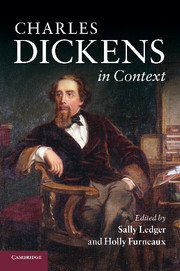Book contents
- Frontmatter
- Contents
- List of illustrations
- Notes on contributors
- Preface
- Notes on references
- PART I LIFE AND AFTERLIFE
- PART II SOCIAL AND CULTURAL CONTEXTS
- 12 Popular culture
- 13 The rise of celebrity culture
- 14 The newspaper and periodical market
- 15 Authorship and the professional writer
- 16 The theatre
- 17 Melodrama
- 18 The Bildungsroman
- 19 Visual culture
- 20 The historical novel
- 21 The illustrated novel
- 22 Christmas
- 23 Childhood
- 24 Work
- 25 Europe
- 26 The Victorians and America
- 27 Educating the Victorians
- 28 London
- 29 Politics
- 30 Political economy
- 31 The aristocracy
- 32 The middle classes
- 33 Urban migration and mobility
- 34 Financial markets and the banking system
- 35 Empires and colonies
- 36 Race
- 37 Crime
- 38 The law
- 39 Religion
- 40 Science
- 41 Transport
- 42 Illness, disease and social hygiene
- 43 Domesticity
- 44 Sexuality
- 45 Gender identities
- Further reading
- Index
34 - Financial markets and the banking system
Published online by Cambridge University Press: 05 August 2012
- Frontmatter
- Contents
- List of illustrations
- Notes on contributors
- Preface
- Notes on references
- PART I LIFE AND AFTERLIFE
- PART II SOCIAL AND CULTURAL CONTEXTS
- 12 Popular culture
- 13 The rise of celebrity culture
- 14 The newspaper and periodical market
- 15 Authorship and the professional writer
- 16 The theatre
- 17 Melodrama
- 18 The Bildungsroman
- 19 Visual culture
- 20 The historical novel
- 21 The illustrated novel
- 22 Christmas
- 23 Childhood
- 24 Work
- 25 Europe
- 26 The Victorians and America
- 27 Educating the Victorians
- 28 London
- 29 Politics
- 30 Political economy
- 31 The aristocracy
- 32 The middle classes
- 33 Urban migration and mobility
- 34 Financial markets and the banking system
- 35 Empires and colonies
- 36 Race
- 37 Crime
- 38 The law
- 39 Religion
- 40 Science
- 41 Transport
- 42 Illness, disease and social hygiene
- 43 Domesticity
- 44 Sexuality
- 45 Gender identities
- Further reading
- Index
Summary
Charles Dickens left an estate of nearly £80,000 at his death. It was an enormous sum, and even more so for one whose father had been so famously unsuccessful with money. Dickens had made the serial publishing of his fiction pay well. Thirty-four thousand copies of each monthly instalment of Bleak House (1851–3), to take but one instance, had been sold. On that project alone, Dickens had made for himself £11,000. He used capitalist systems effectively: investment, sound banking, profitable trading practices. His son, Charley, worked for eighteen years with Barings, the merchant bank: his education was paid for by the novelist's friend, Angela Burdett-Coutts, who had inherited a fortune from the Coutts bank. Charley's career was a disappointment, but it made Dickens's personal connection with banking even closer.
The novelist was not averse to the modern capitalist world of finance – and it served him and his family well. But it is easier to remember the Dickens who was impatient with other sides of a capitalist economy. Dickens as a ‘social critic’, particularly for first-generation Marxist writers, was understood to be a powerful ally against the relations of production generated by industrial capitalism. David Craig, the Marxist editor, thought Hard Times (1854) was ‘concerned … to question the intrinsic nature of industrial organization’, making Dickens sound close to Marx himself. That view, from 1969, became influential.
- Type
- Chapter
- Information
- Charles Dickens in Context , pp. 276 - 283Publisher: Cambridge University PressPrint publication year: 2011



